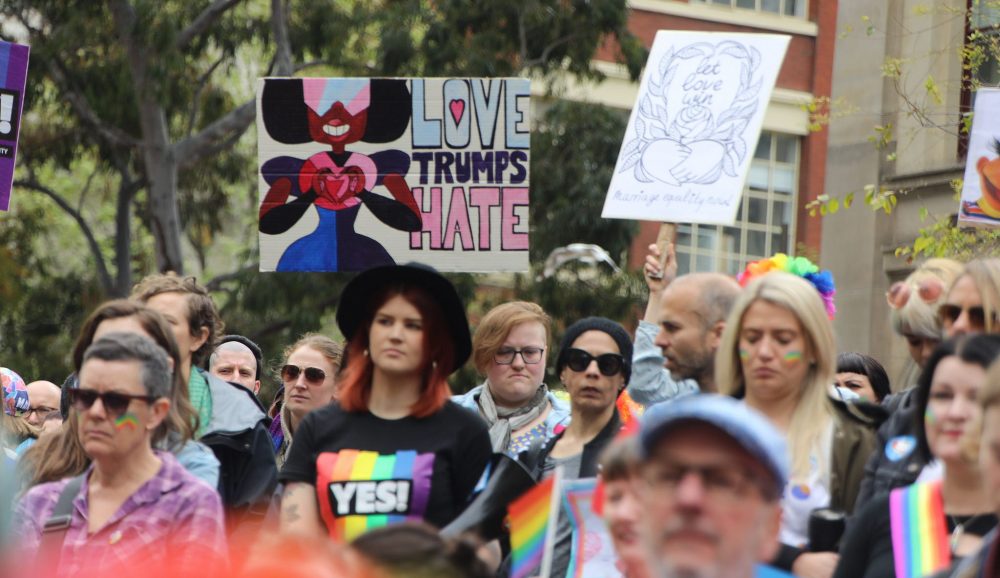
Even if Yes wins tomorrow SSM is not the end of the road

Imagine waking up one morning a few months from now knowing that marriage equality has been achieved.
You’re lying in bed the morning after the legislation finally passes and perhaps you’re wondering “what next?”
Well, the postal survey was fought on the back of that ‘what next’.
According to the No campaign, you’ll be asking that question as you stare into the genderless abyss.
Cory Bernardi says that marriage equality is a ‘rainbow Trojan horse’ which will smuggle in compulsory radical gender and sexuality education to our schools, and Tony Abbott warns that it will usher in fundamental and damaging changes to the way we think about and do ‘family’ and ‘community’.
We have been asked to believe that as we lie in bed the day after marriage equality passes the gendered status quo will be quietly unravelling, teachers will be plotting ways to meaningfully support the rainbow kids in their classes, and radical gender and sexuality theorists will be dreaming up ways to encourage their students to think critically about what makes a family.
We have been asked to believe that when marriage equality passes, heteronormativity – that is, the idea that heterosexuality is good, natural, right, and best – will have suffered a crucial blow.
To be honest, that sounds like a fun morning after to me. But then, I would say that – it is literally my job to teach the ‘radical gender and sexuality’ theory that Bernadi and other No campaigners have been spreading fear about.
According to the Yes campaigners, society will not unravel: indeed, they claim that marriage equality will do nothing more than extend access to the institution of marriage itself, in the process providing LGBTIQ people, especially LGBITQ young people, with what Kerryn Phelps describes as bit of extra ‘dignity’.
Although the No campaigns’ version of events sounds frankly thrilling to me, if all this vote leads to is to return the language of the Marriage Act to its pre-2004 state then the Yes campaign’s more modest prediction seems more likely to be true.
Don’t get me wrong – providing LGBTIQ people with a little extra ‘dignity’ as they make their way through social spaces set up to ignore or exclude them is no small thing.
We know for a fact that issues like marriage equality have an impact on queer mental health.
The CEO of Reach Out, Jono Nicholas, says that there has been a 20 per cent increase in people accessing their LGBTIQ services during this postal survey period.
And Dr Jo Robinson, a senior researcher at the National Centre of Excellence in Youth Mental Health at the University of Melbourne, has noted that that the implementation of same-sex marriage policies in the United States has been associated with a seven per cent relative reduction in the proportion of high school students attempting suicide.
However valuable it will be to those of us it directly effects, however, removing the phrase ‘between a man and a woman’ from the definition of marriage will not spell the end of intimate injustice.
If we aspire to a world that supports people to live and love in whatever consensual arrangement makes them thrive, then marriage equality cannot be the end of the road.
Marriage equality won’t dismantle couple privilege. If anything, it seems likely to extend and intensify it.
Marriage equality won’t unravel the gender binary or end cisgender privilege. Genderqueer, trans, and gender diverse people have been used as threats in this debate, and cisgender members of the LGBTIQ community must remember injustice and fight to right it.
And marriage equality won’t lessen stigma surrounding non-normative sexual practices between consenting adults.
We need to continue to stand against all attempts to discriminate against or shame people based on their kinks or quirks.
The No campaign’s threats of a genderless society characterised by a radical reimagining of The Family won’t just spring into being if the Yes vote wins. Their nightmare – which in many ways is my dream – won’t come true without a fight.
And it’s a fight worth having. It’s worth having for kids whose families aren’t recognised in school family tree activities, for non-monogamous people who have no protections against their relationship status counting against them in the workplace or the custody battle, for single people who are regularly made to feel like they’re missing something whether or not they agree, and for all those whose gender identities or sexual preferences continue to make them vulnerable to cruelty and discrimination.
There is no slippery slope. If marriage equality is the horizon we will only change marriage equality. If we want a world without intimate oppression or injustice we’ll need to roll up our sleeves and do the work to build it.
Jessica Kean is a Scholarly Teaching Fellow in the Department of Gender and Cultural Studies at the University of Sydney. She recently spoke at the University of Sydney event Raising the Bar as part of a talk on ‘Marriage Equality: The Morning After’.










well you can keep your dream – genderless society – that’s your extreme view ?
This article is a snippet from a talk given at Raising the Bar 2017. You can listen to a podcast of the full talk at:
https://soundcloud.com/raising-the-bar-sydney/jess-kean-marriage-equality-the-morning-after-raising-the-bar-2017?in=raising-the-bar-sydney%2Fsets%2Fraising-the-bar-2017
It is also available on iTunes.